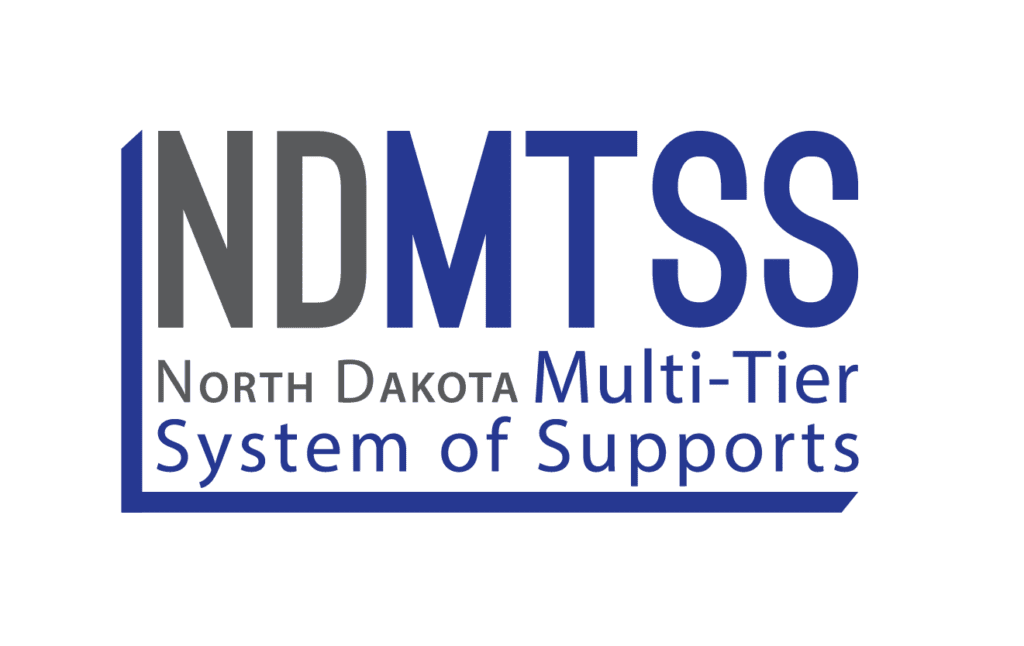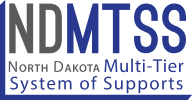Frequently asked questions
General
What is Multi-Tiered System of Support (MTSS)?
MTSS is a comprehensive and preventative framework within a school or district designed to support all students’ academic, behavior, and social emotional needs, with the purpose of meeting students where they are in their learning and moving them forward. The level of each students’ needs is determined through universal and diagnostic assessments. A layered continuum of supports implemented with fidelity, ensures desired outcomes in each area.
What is North Dakota MTSS (NDMTSS)?
NDMTSS is a framework to provide all students with the best opportunities to succeed academically, socially, emotionally, and behaviorally in school. NDMTSS focuses on providing high-quality instruction and intervention matched to student need, monitoring progress frequently to make decisions about changes in instruction or goals. Data are used to allocate resources to improve student learning and support staff implementation of effective practices.
What are the Guiding Beliefs of NDMTSS?
- Effective teachers create environments where all students can learn and improve.
- Effective schools maintain and communicate a purpose and direction that commit to high expectations for learning as well as shared values and beliefs about teaching and learning.
- Effective systems support both teachers and students by outlining evidence-based instruction and interventions while ensuring appropriate and equitable access to resources and supports
Why NDMTSS?
- Many students have unmet emotional, behavioral and academic needs due to failing to access quality supports.
- Core MTSS practices have been shown to increase students’ access to effective practices and produce better and more equitable social, emotional and behavioral outcomes for students.
- More than ever, there is a need for schools to unify and integrate all the work they do to provide for a more holistic and comprehensive approach that integrates social, emotional, and behavioral supports with academics.
What is the difference between NDMTSS, RtI, and PBIS?
NDMTSS is a comprehensive framework supporting instruction for all learners utilizing intervention, assessment, staff selection and development, leadership, resource allocation, effective communication, and system processes and protocols. Positive Behavioral Intervention Supports (PBIS) and Response to Intervention (RtI) are embedded in the NDMTSS framework.
- PBIS is a proactive, evidence-based framework for supporting student behavior that promotes positive academic, social, emotional, and behavioral outcomes for students. School leadership teams help to develop a system focused on building positive adult and student behaviors, creating safe and effective school environments, and prevention of problem behaviors.
- RtI originated from special education but has broadened into a general education framework that involves evidence-based instruction and interventions, monitoring of student progress, and use of data to make a variety of educational decisions.
How does NDMTSS differ from Special Education?
NDMTSS interventions are designed to meet the needs of all students who are performing below grade level proficiency on specific learning targets and are part of the general education program. Special education services are provided to students via individualized education plans (IEPs) and legal documents, resulting from extensive assessment typically beyond the NDMTSS intervention process.
More information is available on the ND Department of Public Instruction website.
Who should be on your team?
A School Leadership Team’s primary focus is to facilitate school-wide implementation of NDMTSS. Recommended team members include cross-disciplinary representatives including principal, general and special education teachers, content area experts, student support personnel, and a school NDMTSS Coach.
How to get started?
- Join us for a NDMTSS Overview
- Complete NDMTSS Foundations: System Change and Refinement MOU and submit
- Attend NDMTSS Foundations: System Change and Refinement in person training
- Determine which strand to continue
Contact: Brandie.Ulland@k12.nd.us
What is the Cost of Each Training?
Cost for each training can be found on the MOU for each specific training.
Who to contact about training information?
South East Education Cooperative:
- Brandie Ulland
- info.ndmtss@k12.nd.us
- Or your local REA liaison

Brandie Ulland
South East Education Cooperative (SEEC)
NDMTSS Coordinator/Behavior
Brandie.Ulland@k12.nd.us
Implementation Specific
What are some examples of interventions?
Schools use a universal screener (a social, emotional, behavioral, and/or academic assessment) to identify students in need of additional support. Additionally, school teams may administer a diagnostic assessment on the students to pinpoint specific learning or skill needs. A school-based team helps identify students using a data-based problem-solving process to develop and implement evidence-based interventions and monitor student response.
Who is involved in identifying students to receive an intervention?
Collaborative and student support teams include individuals such as caregivers, educators, and school personnel, with knowledge of the student, grade-level expectations, the data-based problem-solving process, evidence-based academic, social, emotional, and behavioral interventions, progress monitoring, and diagnostic assessment.
What are some examples of interventions at each tier of NDMTSS?
- Coming Soon
Special Education Specific
How can schools leverage MTSS to design and implement IDEA requirements?
Refer to Page 11 of the NDDPI Specially Designed Instruction (SDI) document linked below
Pg 11 NDDPI SDI Doc
How can schools leverage MTSS to design and implement SDI?
Refer to Page 10 of the NDDPI Specially Designed Instruction (SDI) document linked below
Pg 11 NDDPI SDI Doc


